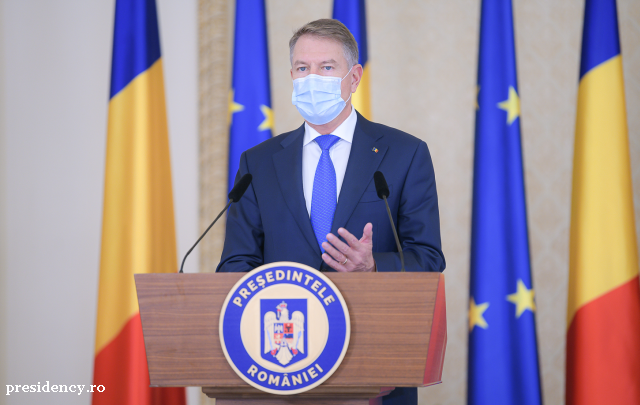We are at the beginning of an extremely important year for the future development of Romania, President Klaus Iohannis said in his first press conference in 2021. He has shown that the authorities are acting towards to major goals: stopping the pandemic and re-launching all economic sectors in parallel with starting the promised reforms. President Iohannis has explained that these are deeply interconnected because the success of the population vaccination is what will generate, to a great extent, the capacity to resume all economic and social activities that were so seriously affected by the pandemic.
Klaus Iohannis: “After an extremely difficult year when we had to make lots of sacrifices, a year when many people have fought with this disease and others, too many unfortunately, have died, here is the new year 2021 that gives us reason to hope. The COVID-19 vaccines are the crowning of scientists’ efforts and a confirmation of the huge progress made in this race against the clock with a new virus, extremely contagious and also very lethal. Mass vaccination is the only solution that will allow us to return to normality as soon as possible and to safely resume all the activities that we have missed so much over the past year. The success of the vaccination campaign is linked to the economic re-launch of Romania, and it will help avoid some deep crises that might have deep consequence for the society, education and economy. It is essential for this vaccination campaign to be successful, so that we can have immunization of the population at national level.”
President Iohannis has announced that he will get vaccinated publicly on Friday, January 15, upon the start of the second vaccination stage, which targets people over 65, people with comorbidities and chronic diseases and the essential staff. The first stage included the people working in the healthcare and social sectors. The president has shown that both him and the prime minister have not been vaccinated so far to avoid criticism that they got vaccinated ahead of other categories and thus to put an end to such speculations.
President Iohannis has also said that this year’s budget will focus on investments, on infrastructure development and supporting the business environment in parallel with accessing more European funds. Moreover, the reform of the big education and healthcare systems needs to be started, the president went on to say. He has also referred to the freezing of salaries in the public sector, and has explained that, in the context of the economic problems caused by the new coronavirus pandemic, this year there is no money for pay rises. The money will be used to keep the salaries at the same level.
President Iohannis has also said that the authorities are not considering relaxing the restrictions for the time being, given that the number of contaminations and deaths continues to be high. We can overcome the pandemic if and only if we observe the restrictions and get vaccinated, Klaus Iohannis has concluded. (tr. L. Simion)

